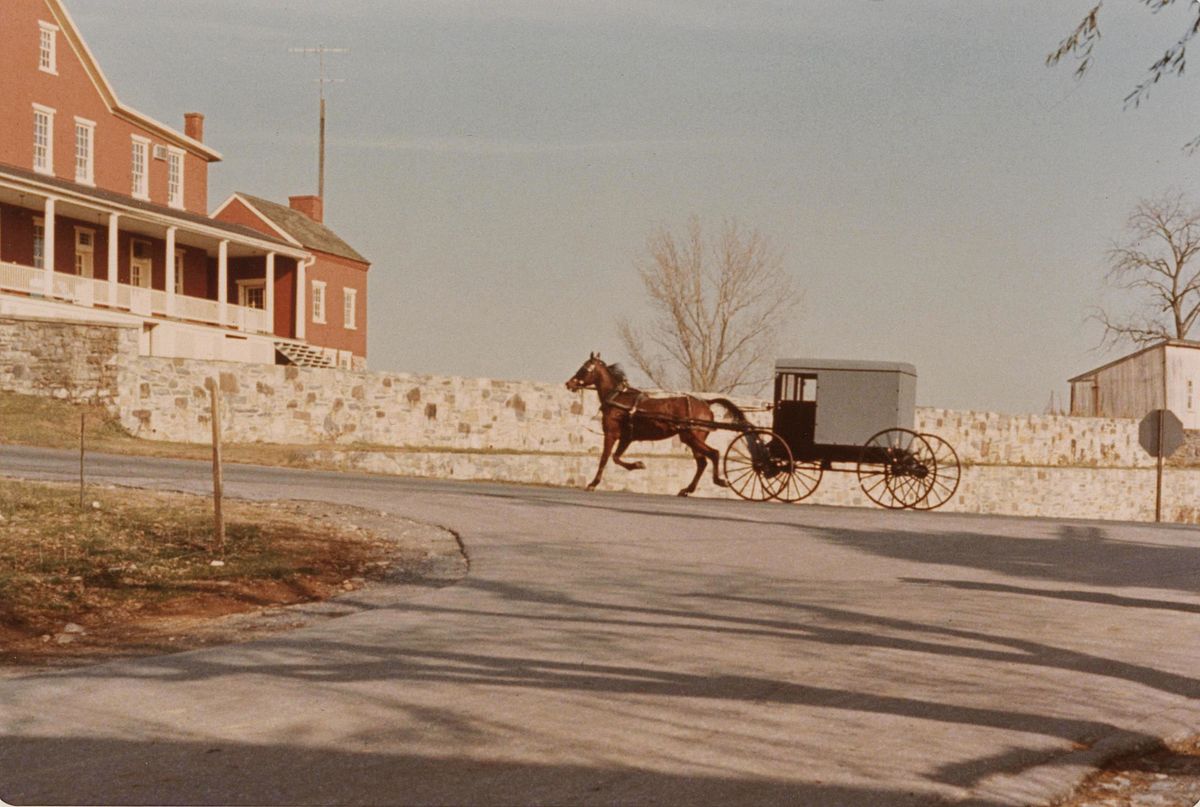Years ago, my family and I spent several long weekends near Lancaster, Pennsylvania, lodging at bed-and-breakfast inns on farms run by Amish and Mennonite families. We ate pounds of cinnamon baked oatmeal and quarts of the best yogurt I’ve ever tasted; we visited Amish milking barns and goat paddocks; my toddlers romped with kittens and chased geese. We drove straight highways flanked by farmhouses, woodworking shops, and acres of green crops, and stopped at roadside stands for homemade root beer and whoopie pies.
As we drove through the countryside, my husband was particularly impressed by the Amish method of stringing clotheslines. Almost every yard featured the diagonally-angled lines, stretching from ground level up to poles nearly ten feet high. He eyed their heavy-duty pulleys, their flapping array of hand-sewn dresses, pants, and shirts, and wistfully remarked how wonderful it would be to have the scent of fresh air lingering in our own laundry. Back then, we lived in a townhouse, bound by the prohibitions of the HOA against all types of outdoor clothes-drying, however tasteful or hidden from view they might be.
I had a wistful feeling similar to my husband’s—of seeing things I desired but perhaps would never have—when I closed David Kline’s book Great Possessions: An Amish Farmer’s Journal. His book of essays is attentive to many things, from the sustainable farming practices of the Amish communities in the Ohio, Michigan, and Indiana areas, to the nuances of natural and community life throughout the seasons on his small-scale family farm, a place run with human flourishing in mind.
Kline’s book also inspired me in many ways. After reading it, I attempted to keep a poster-sized record of bird- and butterfly-sightings on the rural property where we now live. I bought a second-hand book called Nature in Winter, and toted it around during frigid walks with the children, endeavoring to learn the winter manifestations of all the native plants and wildflowers in our area. But I’m a mediocre naturalist with a relatively short attention span; neither attempt lasted particularly long. Still, both of my Kline-inspired projects gave me a fondness for the act of noticing things, whether it was calling out to the kids the sight of the first swallowtail butterfly of the season, or reflecting, during a winter sunset, on the dark elegance of dry coneflower spears set against the sky.
But in spite of my projects, the wistfulness I experienced after reading Kline lingered. The Amish way of life he described seemed so appealing, and so far removed from anything I might ever possess myself. Among many anecdotes, he related his experience of having an accident that required surgery and a week-long stay in the hospital; when he woke up enough to speak to his wife, he demanded to get home, anxious about the need to harvest his wheat. But he needn’t have worried; while he was in the hospital, his family and neighbors had cut and shocked it all. Later, one of the neighbors who had helped Kline with the harvest fell ill himself; his friends and family, in turn, rallied to mow and store all of his farm’s alfalfa hay.
I remember reading this with admiration; but also with a sense of great loss. Even on the hobby farm where we live, we know some, but not all of our neighbors. Life rolls along for us in a way that is relatively similar to the way we lived in our townhouse in the suburbs—we know people in our church and work and sports communities, and we are involved in various far-flung ministries, educational endeavors, and musical projects. I have often wondered if our non-Amish lifestyle here could sustain anything like what Kline described.
Recently I had the unfortunate opportunity to discover that yes, it can. Several crises—a serious accident, an extended hospitalization, and a sudden death of a loved one—piled themselves one after the next upon my family. The tasks of the day—homeschooling the children, driving them to their classes and activities, cleaning the house, cooking dinner—all seemed impossible. Until, suddenly, they weren’t.
Within one day of the accident, a friend from church told me the community had rallied to bring meals to my family for the next month. Neighbors suddenly showed up at my door to drive my daughter to ballet, and my other children to their co-op classes. Far-away friends and family sent money for gas, gift cards, prayers, and uplifting text messages. One far-off friend even showed up at my door to stay for a few days, cheerfully wrangling my youngest children through their daily tasks and activities while I was otherwise engaged.
Wendell Berry wrote in the introduction to Great Possessions that admiration and even a pang of nostalgic envy for the Amish way of life makes sense, in some regard. We notice the disintegration of our lives more sharply, while observing the integrated simplicity of theirs.
While there can be a temptation to idealize the Amish while standing on the outside looking in, I’ve had enough chances to chat with Amish and Mennonite families to know that their communities suffer just like ours. While their agrarian lifestyles might be unencumbered by the distractions of flashy technology, their lives are not Edenic. Like us, they constantly struggle with questions of compromise or fidelity; they stumble as they try to live out what they believe in and value, and they suffer the inevitable tensions arising from human brokenness.
Still, Berry maintains, the particularly Amish ways of working, rejoicing, and relaxing work together to promote the “great possessions” enumerated by Kline in his essays. “The lives of fellow creatures and our delight in those lives are great possessions,” writes Berry. Kline delights in what surrounds him on his daily round of labor, whether it be nesting bobolinks, his children, or the neighboring farms whose owners he all knows by name. It took a crisis for me to take deeper delight in my own community; to relish the people, both local and far-flung, who care for my family and who bear us up, much like the Amish bear one another up in times of need.
When we moved out to the rural area where we now live, one of the first things my husband did, aside from planting an orchard of fruit trees in our front yard, was string up an Amish-style clothesline. Our clothes fluttered across the back yard, emblems of our laundry’s liberation from the repressive strictures of the HOA. Yet, even while living the dream on our little hobby farm, when I read Great Possessions, I felt wistful—one couldn’t set up a community like a clothesline, or plant one like a tree, I thought.
I recall this wistfulness with chagrin now, in these post-crisis days, chagrin for all the moments I spent mourning what I thought I lacked as a mainstream American trying to make a go of it in a rural corner of the world. On the one hand, I realize that community is not an abstract thing that just “exists”— it is intentionally built, painstakingly planted by many small acts of generosity, attention, and charity towards those around us. On the other hand, I realize the capacity of the community that already surrounds us for mercy, outreach, and care. These are all, indeed, great possessions, great gifts. I wonder, now, how many more “great possessions” might I miss, might we all miss, by focusing too much on what we think we don’t have?
Image credit: via Wikimedia Commons







1 comment
Dan Grubbs
I have done business with and known a few Menonite families and can certainly identify with the temptation to covet some of the things I’ve observed in Menonite culture. I amost always seek out one or two of the men at the many farm auctions I attend and chew the fat for the day with them rather than the “English” kind. Yes, there is trial and challenges in their way of life, not the least of which is the prejudice they face from peope like us who misunderstand them and are often jealous of their collective ability. We have a lot more we could learn from these communities if we would only get past our pettiness.
Comments are closed.